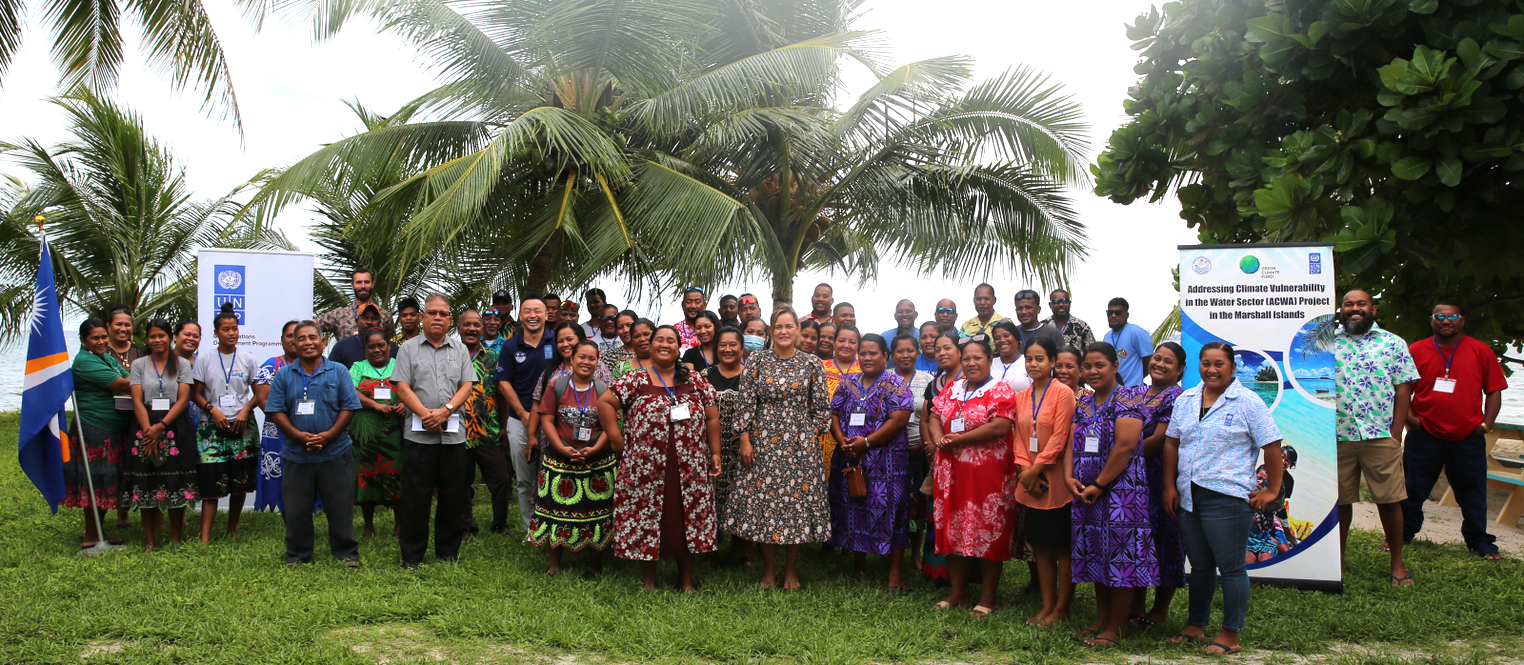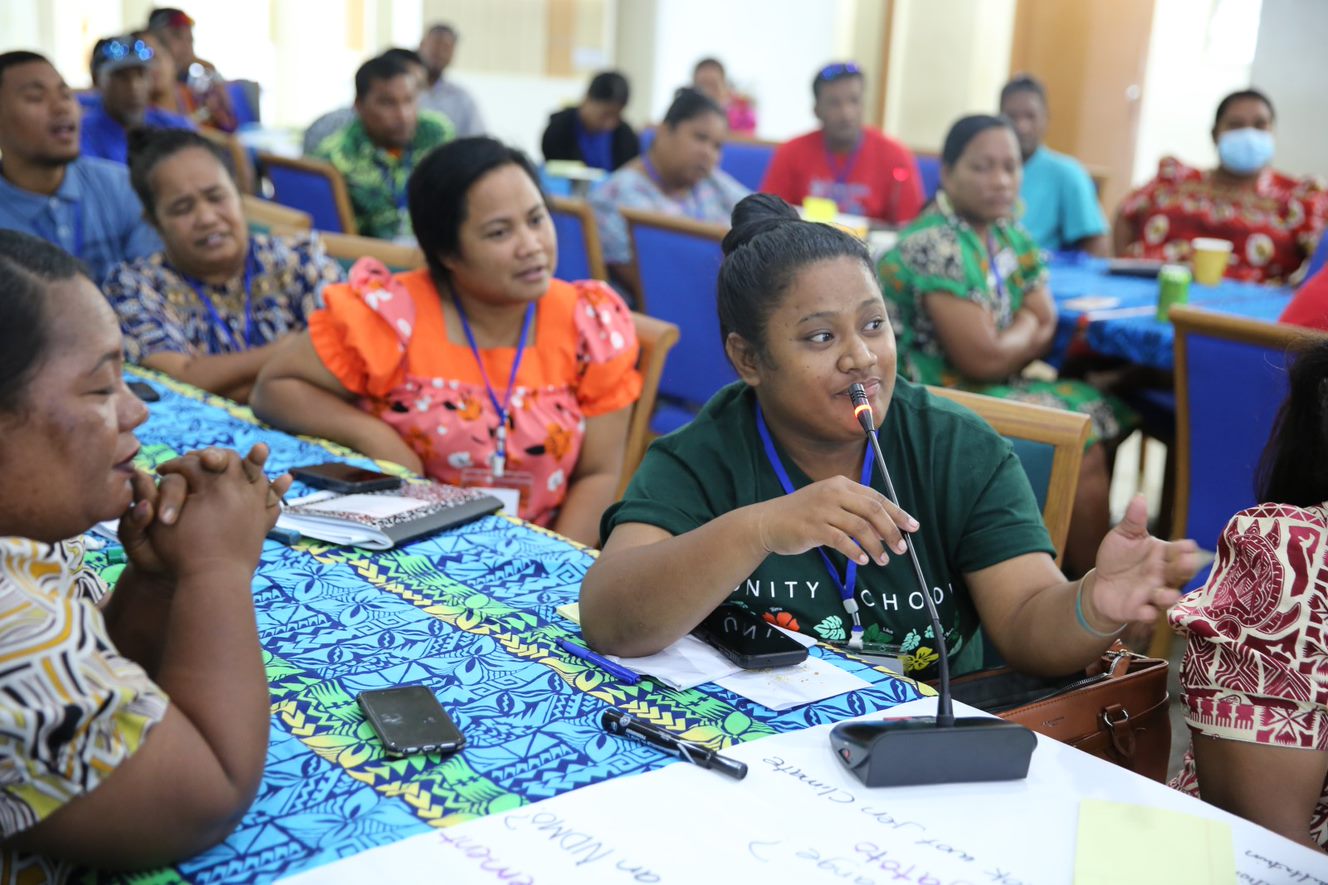“Building Resilience: Women and Youth in Marshall Islands Strengthen Capacities in Water Safety, Climate Change and Gender Equality”
July 25, 2023

Participants at the five-day training workshop focused on water safety management, climate change adaptation, disaster risk reduction, and gender equality.
A five-day training workshop focused on water safety management, climate change adaptation, disaster risk reduction, and gender equality was successfully conducted in Majuro from 10-14 July 2023. The training, now in its third consecutive year, was organized by the United Nations Development Programme (UNDP) through the GCF funded ACWA Project (Addressing Climate Vulnerability in the Water Sector Project) in the Marshall Islands.
With a specific emphasis on gender mainstreaming and climate-resilient water security and governance, the workshop empowered 64 participants, including 31 women, representing all 24 outer atolls and islands. The intensive training sessions facilitated knowledge exchange on crucial topics such as gender equality, water quality testing, hazards and disasters, drought contingency planning, water safety plans, community-based water committees, and technical operation and maintenance of water infrastructures.
During the workshop, participants had the opportunity to visit Rongrong Island and witness the recently installed 15,000-gallon Flatpack Modular water tank located at the Rongrong High School Boys Dormitory. The visit served as a valuable firsthand experience of the positive impact of the ACWA project on the community and its water resources.
Hon. Secretary of the Ministry of Culture and Internal Affairs (MoCIA), Mr. Andary Elbon, expressed his support for the ACWA project, recognizing the importance of addressing climate change challenges and inclusive partnerships to combat severe drought induced by climate change in the Marshall Islands. He said, “Our community has been facing severe drought induced by climate change and this project is very inclusive for the most vulnerable group in the community with strong partnership with Government of RMI, such as Environmental Protection Authority (EPA).”
Koji Kumamaru, the ACWA Project Manager, stressed the significance of community leaders increasing awareness and ensuring the proper operation and maintenance of water infrastructures through the formation of community-based water committees. Kumamaru said, “As community leader, you will need to increase awareness amongst your communities and ensure proper operation and maintenance of water infrastructures through forming community-based water committees.” The workshop fostered proactive discussions and knowledge sharing among facilitators, participants, and ACWA staff, providing valuable insights into future climate change impacts and adaptive strategies for securing sustainable water access.

Group work at the five-day training workshop focused on water safety management, climate change adaptation, disaster risk reduction, and gender equality.

Participants enjoyed healthy discussions at the training workshop on water safety management, climate change adaptation, disaster risk reduction, and gender equality.
The intensive five-day training allowed exchange among facilitators, participants, and ACWA staff, focusing on crucial topics such as Gender Equality and Gender Mainstreaming, Water Quality Testing and Monitoring, Hazards and Disasters, National Drought Contingency Plan, National Water Safety Plans, Community-based Water Committee, and Technical Operation and Maintenance of water infrastructures. These sessions were characterized by active engagement and enthusiasm.
The success of these sessions can be attributed to the valuable contributions of various partners, including Tony Alik from WAM, along with organizations such as MoCIA, EPA, National Disaster Management Office (NDMO), Climate Change Directorate (CCD), International Organization for Migration (IOM), Jo-Jikum (NGO), and UNDP. Their significant involvement greatly facilitated the training sessions.
During the field visit to Rongrong Island, one of the participants from Namdrik Atoll, Jitiem, expressed great admiration for the achievements of the ACWA project in the Rongrong community through the installation of the flat pack modular tank. Jitiem was particularly impressed by the first flash monitoring of the water level equipment and expressed gratitude for the valuable training opportunities and site visit. “I was very impressed to see and learn the accomplishment of what the ACWA project has created to the community through the installation of this flat pack modular tank and was empowered through this training to contribute to awareness raising for gender equality and water safety management in my family and community when I return to Namdrik Atoll,” she added.
Ms. Moriana Phillip, the EPA General Manager, also accompanied the participants on the field visit and expressed her happiness in showcasing the initial outcomes to them. She highlighted the importance of visualizing and learning from these results, which can now be shared with their respective communities. “I am very happy to show our first results to the participants. They can now visually see, learn and take their learnings to their respective communities,” she explained.
Richard Jejjo, the ACWA Chairperson for the Lib Community Water Committee (CWC) on the island of Lib, conveyed his deep admiration for the setup of the Rainwater Harvesting System and Modular Tank in Rongrong Island. He firmly believes that this installation will greatly benefit the entire community of Lib Island to augment accessing drinking water throughout the year. Having been involved since the Technical Design Survey (TDS) conducted by ACWA, where the team measured homes and community buildings, Richard witnessed the project unfold. He enthusiastically shared his confidence in the ACWA project, and the upcoming significant installation works with his community members, feeling ecstatic about the results observed firsthand in Rongrong. He said, “Witnessing first-hand the results on Rongrong of installation of Flatpack Modular tank, I am ecstatic and feel more confident about going home and sharing with my community about the ACWA project and the important installation works that is about to begin”.
The GCF funded ACWA project aims to improve access to safe drinking water through enhanced rainwater harvesting systems across the 24 atolls and islands in the Marshall Islands. It recognizes that sustainability in water security, resilience, and governance requires not only hardware interventions but also motivated and skilled human resources within the communities.
This training workshop marks a significant milestone in the ongoing efforts to build resilience, combat climate change, and promote gender equality in the Marshall Islands. UNDP and its partners remain committed to empowering communities and creating a sustainable water future for all.
The ACWA project is funded by Green Climate Fund (GCF) and Government of RMI from 2020 to 2027, to improve household and community rainwater harvesting and storage structures and to increase resilience of water supply in all RMI’s 24 neighboring Atolls and Islands.
For media inquiries, please contact:
Koji Kumamaru, Manager, RMI ACWA Project, Email: koji.kumamaru@undp.org
About UNDP: The United Nations Development Programme (UNDP) works in nearly 170 countries and territories, helping to eradicate poverty, reduce inequalities, and build resilience to promote sustainable development.

 Locations
Locations



